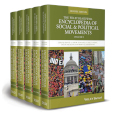COVID-19 Pandemic, Collective Behavior, and Protest
Abstract
Disasters occasioned by nature, or “acts of God” as they are sometimes called, are infrequent, temporally irregular events such as earthquakes, hurricanes, tornadoes, tsunamis, floods, and forest fires. All such events are calamitous for the segment of the population experiencing them, but their impact is typically localized rather than geographically generalized. Such is not the case with pandemics, however, as their impact ripples across the globe, leaving few areas untouched. This has been the case with COVID-19, which has been the most widespread and deadly worldwide pandemic since the Spanish flu of 1918. Historically, attempts to mitigate the spread of a pandemic have typically involved border or community closings, residential lockdowns, mask wearing, handwashing, and other measures specific to the time period. These mitigation directives and efforts, in combination with the unease generated by the virus, predictably generate a heightened state of what Snow and his colleagues call “quotidian disruption.” It is a kind of anomic state in which the taken-for-granted patterns of everyday functioning and the routinized expectations associated with those patterns are disrupted. What was once normative and routine is now turned sideways or even upside down. One of the consequences of such disruption is that it gives rise to a heightened sense of fear, which has been posited as one of the major reflex emotions associated with the emergence of a variety of so-called collective behaviors.



